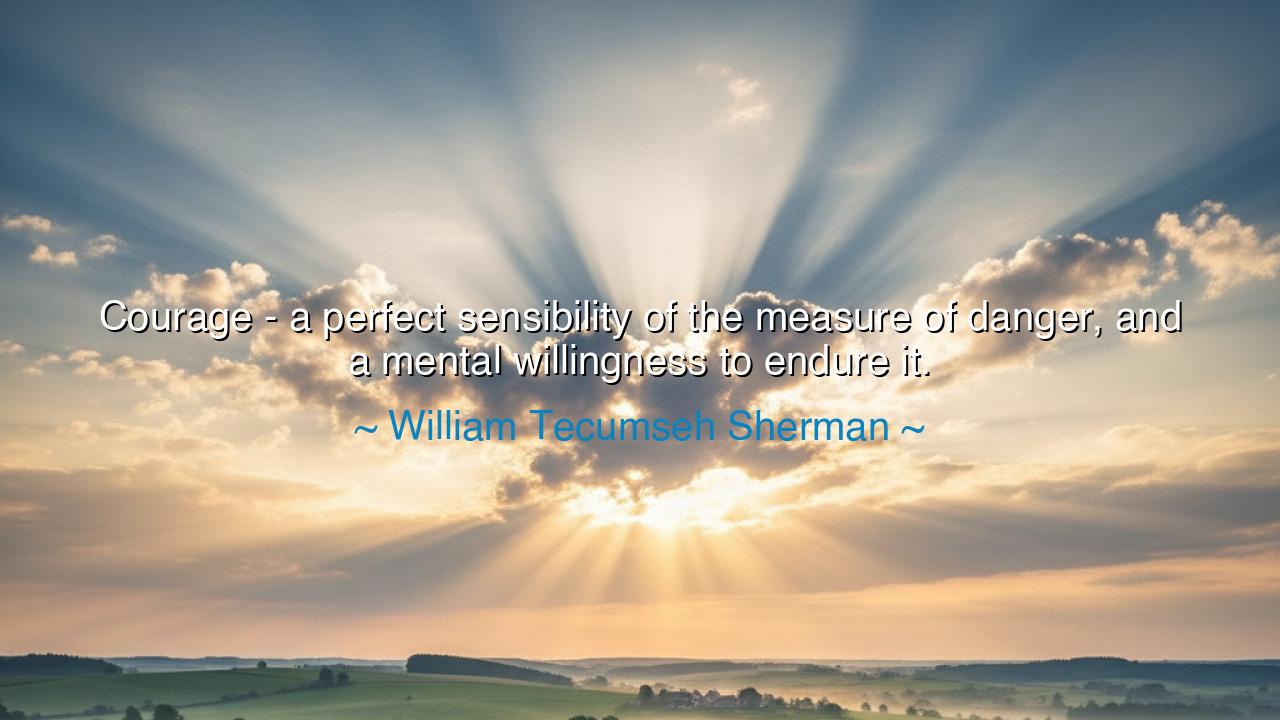
Courage - a perfect sensibility of the measure of danger, and a
Courage - a perfect sensibility of the measure of danger, and a mental willingness to endure it.






“Courage – a perfect sensibility of the measure of danger, and a mental willingness to endure it.” Thus spoke William Tecumseh Sherman, the iron-willed general whose name became both a cry of victory and a whisper of awe in the chronicles of war. His words, born from the fire and ruin of battle, carry the depth of one who has looked upon fear not as an enemy, but as a teacher. In this saying lies the essence of true courage—not recklessness, not blind daring, but the union of clear understanding and unshakable resolve. To be courageous, Sherman teaches, is to see danger with open eyes, to feel its weight, and yet to move forward, calm and unwavering.
In the world of men, courage is often misunderstood. Many mistake it for ignorance of fear, or for the hot fury of impulse. But Sherman’s wisdom reaches deeper. He defines courage not as the absence of fear, but as mastery over it. The brave man does not charge blindly into peril; he knows exactly what awaits him, and still he endures. Such courage is both intellect and spirit, the harmony of reason and heart. It is measured strength—neither cowardice, which flees from risk, nor madness, which ignores it. To possess this balance is to walk the line between destruction and triumph with steady feet.
William Tecumseh Sherman spoke these words not from comfort, but from the crucible of war. As a general of the Union Army during the American Civil War, he marched through devastation and despair. He saw men torn apart by cannon fire, cities burned to ash, and the heavy cost of human ambition. Yet through it all, he remained steadfast, not because he loved battle, but because he understood its necessity and bore its burden with clear-eyed resolve. His “March to the Sea” was not a reckless act of fury, but a deliberate and strategic decision—terrible, yes, but guided by grim purpose. In him lived the rare form of courage he described: awareness of danger’s full measure, and a mind willing to face it in service of a greater end.
This definition of courage echoes the teachings of the ancients. The philosopher Aristotle once wrote that courage is the mean between cowardice and rashness—the perfect tempering of fear and confidence. The coward flees before he must; the reckless leaps before he thinks. But the courageous man weighs the danger, accepts it, and acts despite it. So too did Sherman understand this balance. His courage was not born of pride or rage, but of disciplined thought. He saw war not as glory, but as duty, and his endurance was not the denial of fear, but the quiet decision to continue in its presence.
History gives us many who embody this sacred form of bravery. Consider Ernest Shackleton, the explorer who led his crew through the frozen desolation of Antarctica when their ship, Endurance, was lost to the ice. He understood the vastness of the peril—hunger, cold, despair—and yet he never wavered. He measured the danger perfectly and resolved to endure it. His courage was not the loud cry of the hero, but the steady voice of the leader who says, “We go on.” Every man under him survived, not because fortune favored them, but because their captain possessed that same mental willingness to endure that Sherman praised.
Such is the nature of true courage—it is quiet, steady, and deeply human. It does not boast, nor does it seek glory. It is the courage of the soldier who advances knowing the cost, the mother who endures hardship for her children, the soul who speaks truth though the world condemns it. All these are acts of measured bravery—born not of blindness, but of clarity. To feel fear and yet persist is the noblest act of the heart. For without fear, courage is meaningless; and without endurance, courage is fleeting.
So, my children, remember this wisdom: when danger looms, do not pretend it is small. See it in full—its size, its sharpness, its weight. Then, having seen, stand your ground. For courage is not in denial, but in decision. Train your mind to remain calm when others tremble. Strengthen your spirit to endure what must be faced. Let your courage be like the mountain: unshaken by storm, yet shaped by time and trial.
For in the end, as Sherman knew, life itself is a battlefield of choices. You will not always have strength, nor will you always have certainty. But if you cultivate courage—the clear awareness of danger and the steadfast will to meet it—you will walk through every shadow with your head held high, and no fear shall rule your heart.






AAdministratorAdministrator
Welcome, honored guests. Please leave a comment, we will respond soon